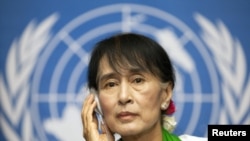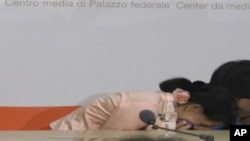Burmese opposition leader Aung San Suu Kyi fell ill during a news conference in the Swiss capital, Bern, late Thursday, shortly after saying how exhausted she was after her long trip from Asia to Europe.
After getting a rock star welcome in Geneva, where she gave a speech to the International Labor Organization conference, the Nobel peace laureate looked pale as she answered questions from reporters alongside Swiss Foreign Minister Didier Burkhalter. A few minutes into the news conference, she halted, said "I'm so sorry," and threw up. Her aides quickly escorted her out of the room.
A spokesman for the Swiss Foreign Ministry, Jean-Marc Crevoisier, said Aung San Suu Kyi recovered enough to briefly attend a reception hosted by President Evelyn Widmer-Schlumpf but then retired to her hotel to rest.
On Friday, she will visit the Swiss parliament before heading for Oslo to deliver a long-awaited acceptance speech for the 1991 Nobel Peace Prize, which she was unable to accept in person. Later in the trip, Aung San Suu Kyi will address Britain's parliament and receive an Amnesty International human rights award in Dublin from rock star Bono.
The newly-elected lawmaker is expected to return to Burma in time for the July 4 reconvening of parliament, which is set to consider crucial legislation, including laws on media regulation and foreign investment.
Aung San Suu Kyi is on a two-week trip to Europe, her first visit to the continent in 24 years after spending most of the previous two decades in detention in Burma. The trip comes as Burma's new nominally civilian government has begun making democratic reforms after decades of military rule.
In her speech in Geneva, Aung San Suu Kyi called for international aid and investment that will help promote further democratic reform in Burma. The newly elected lawmaker said in an address to the International Labor Organization that she would like to see the Burmese government make additional reforms to protect the rights of workers in the once isolated country.
She also expressed concern about the violence between Muslims and Buddhists that has gripped western Burma for over a week. She told reporters that such violence will continue unless the rule of law is ensured and every citizen is guaranteed equal protection.
In answer to a question, Suu Kyi said countries should consider lifting sanctions against Burma in a responsive way, in a way that advances democracy.
View the timeline of Burma's opposition leader Aung San Suu Kyi
After getting a rock star welcome in Geneva, where she gave a speech to the International Labor Organization conference, the Nobel peace laureate looked pale as she answered questions from reporters alongside Swiss Foreign Minister Didier Burkhalter. A few minutes into the news conference, she halted, said "I'm so sorry," and threw up. Her aides quickly escorted her out of the room.
Burma - Suu Kyi Travel Factbox
After traveling to Thailand, Aung San Suu Kyi visits Europe:- Jun. 16: Oslo, Norway to accept her 1991 Nobel Peace Prize
- Jun. 18: Ireland to appear with Bono at a concert in her honor
- Jun. 20: Oxford, Britain to receive an honorary doctorate from the University of Oxford
- Jun. 21: London, Britain to address parliament
On Friday, she will visit the Swiss parliament before heading for Oslo to deliver a long-awaited acceptance speech for the 1991 Nobel Peace Prize, which she was unable to accept in person. Later in the trip, Aung San Suu Kyi will address Britain's parliament and receive an Amnesty International human rights award in Dublin from rock star Bono.
The newly-elected lawmaker is expected to return to Burma in time for the July 4 reconvening of parliament, which is set to consider crucial legislation, including laws on media regulation and foreign investment.
Aung San Suu Kyi is on a two-week trip to Europe, her first visit to the continent in 24 years after spending most of the previous two decades in detention in Burma. The trip comes as Burma's new nominally civilian government has begun making democratic reforms after decades of military rule.
In her speech in Geneva, Aung San Suu Kyi called for international aid and investment that will help promote further democratic reform in Burma. The newly elected lawmaker said in an address to the International Labor Organization that she would like to see the Burmese government make additional reforms to protect the rights of workers in the once isolated country.
She also expressed concern about the violence between Muslims and Buddhists that has gripped western Burma for over a week. She told reporters that such violence will continue unless the rule of law is ensured and every citizen is guaranteed equal protection.
In answer to a question, Suu Kyi said countries should consider lifting sanctions against Burma in a responsive way, in a way that advances democracy.
View the timeline of Burma's opposition leader Aung San Suu Kyi
Loading timeline...






